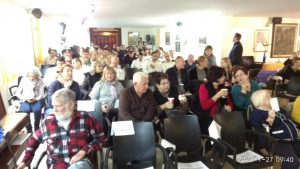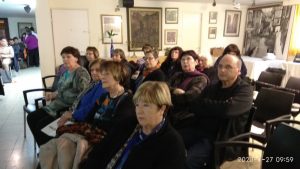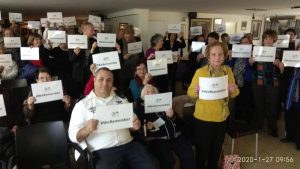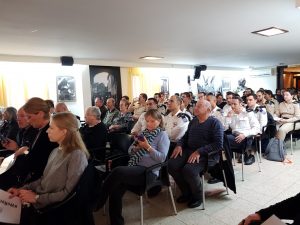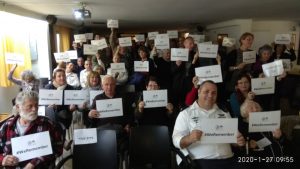International Holocaust Day 2020
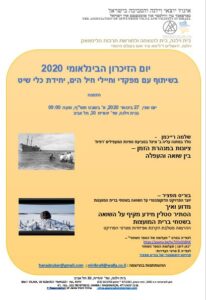 In January 2020, in keeping with the start of every year, we gathered together on International Holocaust Remembrance Day in Beit Vilna for a seminar together with our adopted Navy unit, survivors and their ensuing generations, the Deputy Lithuanian Ambassador and Cultural Attaché who sat captivated by the stories of the Holocaust, revival and Zionism.
In January 2020, in keeping with the start of every year, we gathered together on International Holocaust Remembrance Day in Beit Vilna for a seminar together with our adopted Navy unit, survivors and their ensuing generations, the Deputy Lithuanian Ambassador and Cultural Attaché who sat captivated by the stories of the Holocaust, revival and Zionism.
Among those who participated on this occasion were Shlomo Reichmann who was born in a DP camp and came to Eretz-Israel with his parents when he was just a few weeks old on the illegal immigrant ship Rafiah, and Boris Maftsir, producer of the film The Mystery of the Black Book.
Shlomo Reichmann’s story:
Shlomo Reichmann, the baby who was rescued, talks about the sinking of the Rafiah, and about the Holocaust survivors, who had managed to stay alive and who had been brought together from all over Europe by Jewish Agency emissaries and placed in temporary camps until their immigration to Eretz-Israel. His parentsz”l were on board the Rafiah.
I was born in an abandoned German military camp in a small fishing village in Yugoslavia, which had been acquired by Jewish Agency emissaries and turned into a hospital. At the height of winter, when the weather and sea conditions were intolerable, a decision was made to sail from the port of Bakar in Yugoslavia. After two weeks of sailing among the Greek islands in order to evade the British navy, the captain decided to seek shelter on one of the islands. That period was like hell at its worst. The illegal immigrants, including babies, children, teenagers and adults, endured overcrowding and distressing conditions. Gad Lasker, the ship’s commander, ordered the boat to be anchored in a small cove on the small island of Syrna, west of the Isle of Rhodes. While attempting to anchor, the ship hit the rocks and started to take on water. It is difficult to describe the panic and shock that ensued. 688 people in a tub trying to save themselves in the worst possible weather. It was a freezing cold morning, with waves reaching 4-5 meters, people in just the barest of clothing were trying to jump on the rocks and into the raging sea. I was just 38 days old. My mother was very ill and couldn’t nurse me as she had no milk. My father used his finger to feed me honey from a jar that he had hung above the bunk, whenever I cried and was hungry. When the boat crashed, my father was on deck with another young man to get some fresh air. In a flash, he wrapped me in a blanket and shouted out to those who had managed to jump on the rocks to catch me. The young man who had been with my father tried to stop him from throwing me, but my father didn’t heed him and threw me towards the rocks. Unfortunately, I landed on a flat rock. A young woman of about 36 saw the blanket and tried to get hold of it. After failing once, she managed to get hold of the blanket the second time but didn’t realize that I, the baby, was inside it. After opening the ‘package’ and finding me there, she started shouting to those on board not to throw any more infants overboard. 34 years later, I met her for the first time at a reunion for Rafiah survivors. That young woman saved me and took care of me without managing to find my parents until few days later when my cousin, who was 32 at the time, recognized me. My mother was found by one of the other illegal immigrants in another part of the island and so we were all reunited with my father.
The whole island was rocky and uninhabited. It is a volcanic island with a number of caves above the waterline where we were able to shelter from the wind and rains. Many of the passengers were injured after being crushed between the ship and the rocks, some people drowned. This hell lasted for 23 minutes after which nothing remained. How these 688 illegal immigrants managed to save themselves – only God knows. A day later, 6 bodies were washed up onto the rocks. It would appear that the others had drowned. A few of the youngsters tried to tie the ship to the rocks, but to no avail. The illegal immigrants were regrouped by the ship’s commander and the radio operator who were trying to allay the situation. After deciding to send some people to explore the island a small 80 sq.m. church was found in which to house the wounded and the children. Later on, they encountered a shepherd and his family. He had apparently been housed there by the Greek government, who supplied him with food and water and other necessities, in order to keep the island from Turkish incursion. The shepherd was asked to help with some milk, water and meat. Negotiations ensued and he demanded jewelry and gold in return for his help, that’s how we came to receive meat and water as well as milk for the babies. The radio was repaired and contact was made with Eretz-Israel and the Jewish Agency, telling them about the sinking of the ship and asking for help.
The irony was that who, but the British, our enemies, came to our assistance after the late Golda Meir had asked them to help save us. A few days later, food, clothes and first aid were parachuted to us on the island, which alleviated the situation. At the same time, British warships were sent to evacuate us. It became clear to all of us that we were not going to get to Eretz-Israel. The men, including my father, were transferred to an internment camp on Cyprus. The women, children and the injured were hospitalized in Rhodes. The rabbi of the Rhodes Jewish Community took my cousin and me under his wing and took care of us until my mother had recovered. From there, we were taken by a Greek boat to Alexandria in Egypt, where the British couldn’t apprehend us. After about 22 months, we reached the port of Haifa from where we were sent to the Atlit internment camp. After going from camp to camp a miracle happened and we met up with my father, and so the whole family was reunited. After being released, we made our way to Kibbutz Ramat HaKovesh.
For about 28 years I went in search of my family’s history. I had been told nothing, only allusions. And so, from the age of 32, I started to explore my past. In time, I made contact with the illegal immigrants and started to investigate and ask questions culminating in making contact with the Mevo’ot Yam Naval School at Michmoret, and Cellcom, an Israeli telecommunications company, thanks to whom I was finally able to discover my story and everything connected to it.
The story is complex and the search for my roots in Hungary completed the picture. More details will be available in my next two-hour lecture, which includes a documentary prepared by Ilana Dayan in cooperation with Tel-Ad, an Israeli production company.
From the website Palyam – A Time Tunnel, the Illegal Immigrant Ship Rafiah, 1946
An interview with Gadi Aisen, director of the documentary Codename: Rafiah: I Dove into a Crazy World – Matan Shiram, Globes, 16.9.2013
Tali Farkash/ "The Soviet mystery: The Black Book would have changed the memory of the Holocaust." 17/10/2019 Ynet
The Black Book documented in minute detail the horrors the Nazis perpetrated on the Jews of Eastern Europe, but then Stalin ordered it to be completely destroyed. Seventy years later Boris Maftzir set out on an historic journey – a documentary tracing the reasons for this action – and its extensive consequences on the Jews of the Soviet Union and the memory of the Holocaust.
The Black Book was supposed to have been published in Moscow in October, 1947; it was a collection of newspaper articles describing what was happening in the Soviet Union under the Nazi occupation along with eyewitness reports of victims and survivors that was intended to document the events of the Holocaust within the borders of the Soviet Union.
A fateful political decision to shelve the document was backed up by orders from none other than Josef Stalin himself; thus the memory of the Holocaust that took the lives of two million, seven hundred Jews in that region disappeared into the depths of the classified Soviet archives.
Boris Maftzir's movie to be shown at the "Haifa Festival" depicts, for the first time, the circumstances leading to the shelving of one of the most significant documents about the Holocaust; the film-maker himself says in a special interview to Ynet that most people who are exposed to the story simply say: "We did not know. In my view, as a maker of documentaries, that is the most important response to the movie."
The Soviets preferred to silence the crimes
Maftzir calls The Black Book a "document in parts" that was put together, in his opinion, by reporters and writers and includes testimonies, wherein lies "its strength". "It is a very comprehensive document in terms of the region, thorough in the collection of stories – and difficult in terms of insight, says Maftzir."The insight is that the
Maftzir explains: "The Germans supplied the leadership, the organization and the methodology – however, they had no hope of implementing the massacres without the local population. Without 'neighbors'". It was precisely those facts – proof that the citizens of the Soviet states were part of the Jewish Holocaust -- that Stalin and the Communist regime could not permit to be publicized. "They thought it was simply too dangerous for them."
The Mystery of the Black Book is a documentary that is based on written documentation of descriptions and eyewitness testimonies, which reveals a previously unknown aspect of the Judeo-Soviet story. "I had intended to simply put the things into some sort of context, in order to clarify the point that hiding the Holocaust enabled the upsurge of Anti-Semitism, which, consequently, enabled the persecution, harm and sanctions that were the lot of the Jews in the Soviet Union.
The Jew who foresaw the Holocaust
Elia Ehrenburg was a writer and a Judeo-Soviet advocate who was born at the end of the 19th century in Kiev. In 1943, in the midst of the annihilation machine, he was a Soviet military reporter, together with Vasily Grossman, for The Red Star; as the two of them accompanied the Red Army, they documented what was happening in the fighting areas that were under Soviet control.
The research activity was supported by the Soviets and about a year later, the first draft of the document was ready. According to the Yad Vashem website, they handed it over to the Anti-Fascist Jewish Committee and copies of the manuscript were circulated outside the Soviet Union as well as in Israel, eventually reaching Yad Vashem. The subtitle said that the book is about "the nefarious and complete massacre of the Jews by the Fascist German occupiers in temporarily occupied areas of the Soviet Union and in death camps in Poland during the war from 1941-1945."
The book was printed secretly in Yiddish before the authorities shelved it completely, claiming that it was hostile towards Soviet citizens, and that it highlights the Jewish suffering over the general deprivation. The authorities went one step further and destroyed the manuscript and all the printing plates.
That was how it came about that, apart from excerpts of eyewitness testimonies and descriptions that leaked to the United States, the whole document was locked and sealed until the fall of Communism in 1991. To be more precise, most of the information in it was inaccessible to Western researchers, which caused significant information gaps about what happened in Eastern Europe during the Holocaust.
Maftzir explains at the beginning of the movie what triggered his interest: "A few years ago I saw a map showing the Holocaust sites in Europe. The area of Central and Western Europe was full of names of concentration camps – a painful and comprehensive display of the past that pursues us even today. However, the right side that showed the Soviet Union was almost empty. Over one thousand cities, towns and villages where Jews had been massacred had been erased from the memory of the Holocaust.
Forty years of hiding the Holocaust within the borders of the Soviet Union ended when the empire disbanded and the independent states were formed. Another thirty years passed and only now, can we present a full picture of the map of the Holocaust."
Dr. Elia Altman from the Holocaust Center in Moscow described the decision as "a crime on a massive scale". "We only discovered the tragedy of almost half the victims of the Holocaust in the 80's and 90's. Every Jewish family, my own too, knew of several tragic cases. Each family knew what happened to it. However, alongside them, there were also brothers and fathers who were killed at the front, so they all experienced the tragedy. This is the tragedy of a single Jew, on the scale of a whole nation that was hidden from this nation."
The Jews endangered "the brotherhood of the nations"
Shelving the book was merely the first step in the de-legitimization of Soviet Jewry. Overnight, from being the core of the Soviet Revolution, they became dangerous citizens with pro-Western tendencies who had to be removed from every source of influence.
Despite the central role he plays in the history of the Soviet Union and the Jews, Ehrenburg is completely unknown to the average Israeli. "In 1922, when he was a young man in Paris, he foresaw the Holocaust in a book that he wrote, The Adventures of Hulio Hornito. He wrote a warning to the Jews after the war under instruction from Stalin, 'You are Soviets, the State of Israel is not for you', following Golda Meir's visit and the joy at the establishment of the State.
Maftzir mentions that the Soviet Union was actually a collection of dozens of nations sharing a geographic area as against the Jews who had, so he says, a different homeland outside the Soviet Union. "What is the significance of all this to the Soviet "brotherhood of nations"? What is the political significance against the dozens of nations that are all 'Soviets' but suddenly there is someone who is not a Soviet and has a different homeland? It could happen that someone whose homeland is in southern Caucasia could also say: "I am not a Soviet. I have a homeland of my own."
"Stalin identified the Jews as a terrible danger to the Soviet story. Add to that the Cold war, the influence of the Jews in the United States and the story of the Fifth Column, making it impossible to dismantle the process. That was one of the reasons the Soviets persisted in their efforts to prevent emigration of Jews to Israel."
Getting to know the story of the Jews on Eastern Europe
According to Maftzir, shelving the book was "an historic event": "One administrative decision changed us, perhaps you and your family too. Under different circumstances you would not have asked what happened next. And how did it happen that almost 50% of the victims of the Holocaust were Soviet Jews? If the book had been published at the time, the map of the Holocaust that I showed in the movie would have looked altogether different."
Joshua Rubenstein, an American historian, says that he grew up with the memory of the Holocaust."I was surrounded by its symbols. Everything focused on what happened in Central and Western Europe. We grew up on the story of Anna Frank, we knew about Auschwitz and Treblinka, but if The Black Book had been published then in 1945-6, it may well have changed the way we remember and understand the Holocaust."
In his work Maftzir commemorates the Holocaust in the former CIS and sheds light on what happened to communities and towns that were wiped off the face of the earth into mass graves, in the main. However, The Black Book directly affected his life behind the Iron Curtain, as a marked Jew.
"My story is that of a 'Judeo-Sovieticus,'"" he says. I am talking about people who experienced some kind of ostracism. It was not complete and all-embracing because there were always success stories – but as a group, they were shattered. What was left for them? They were left with clause 5 in their identity cards, with a sticker that they were Jewish."
According to Maftzir, the consequence of the above was the mass aliyah of Russian Jews in 1990-91, as soon as the Soviet Union disbanded. "Four out of every five Jews left the geographical homeland," he says. "In other words, the vast majority of them are no longer there, It was the most significant wave of emigration since the 19th century when the Irish emigrated to the United States. The Soviet Union had the largest Jewish population in the world at the beginning of last century but the Judeo-Russian romance is over."
They took our memories away
Maftzir, himself, is a former Prisoner of Zion: "I was accused of anti-Soviet Zio nist activity because I dealt with forbidden Zionist literature. When I started to deal with the Holocaust in 2013, I knew that I wanted to touch upon the memory of the Holocaust. Up to about a year ago, I thought it would all be about The Black Book and what would have happened to our collective memory if it had been published. However, about a year ago, the narrative changed. The insight I gained from the movie is the result of that intellectual decision because I know, today, that there is no chance that the book will ever be published.
nist activity because I dealt with forbidden Zionist literature. When I started to deal with the Holocaust in 2013, I knew that I wanted to touch upon the memory of the Holocaust. Up to about a year ago, I thought it would all be about The Black Book and what would have happened to our collective memory if it had been published. However, about a year ago, the narrative changed. The insight I gained from the movie is the result of that intellectual decision because I know, today, that there is no chance that the book will ever be published.
